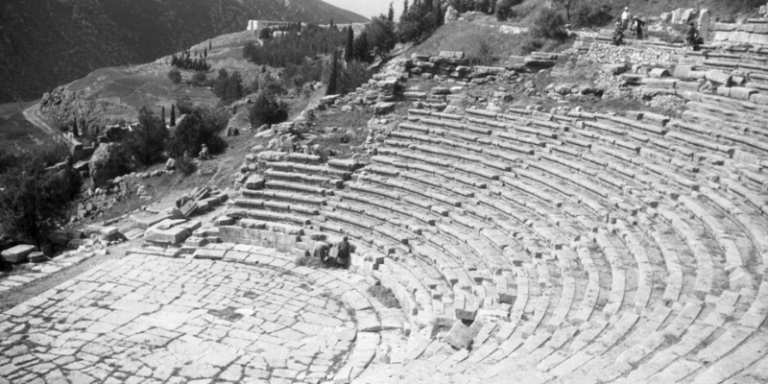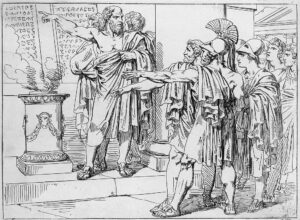Building Societies – What Does it Take?
What does it take to build a successful society? The history of Athens shows how hard it is.
By: Mark Angelides | September 9, 2020 | 748 Words

Olympia, Greece (Photo by Erich AndresUnited Archives via Getty Images)
America has seen many protests, and there are people eager to “tear down” the system – but protesting is easy. The hard part is coming up with solutions and a society that works better than what we have now.
The Greek city-state of Athens is a perfect example of how democratic systems were tried and tested over many years. As a people, the ancient Greeks had an idea of what proper governance should look like and used trial and error over hundreds of years to perfect it.
Draco’s Laws
The first attempt at democracy was seen around 621 B.C. This was spearheaded by a man named Draco. Prior to this, laws were unwritten and mostly unknown by most Athenians. By writing them down and placing them on small three-sided pyramids, every literate person could read the laws.
Yet these laws, and the punishments, were extremely harsh. They were codified by Draco, so it should come as no surprise that the word “Draconian” comes from his name. The punishment for just about every crime, from stealing a cabbage to murder, was death.
Solon’s Reforms
In 594 B.C., this system was updated by Solon. At the time, Athens was run by a group of nine archons – or rulers – each from a noble house. Solon expanded the power to include other groups of society who had always been excluded (although the groups granted these rights were limited in number).
Solon also stopped the use of slavery for the collection of debts from fellow Athenians and created the right to a jury in court. This was a great leap forward in society. Nowhere else in the world could a person’s fate at the hands of the law be decided by other citizens in a jury. Beforehand, the decision was most often at the decree of a ruler or judge. These changes were the first step to making all people equal before the law.

Solon Compels The Athenians To Swear To His New Laws. Line Drawing By Pinelli. (via Getty Images)
Solon introduced other reforms that covered property, sales, tariffs, trade, morality, and just about every subject you can think of. Then he went away on a journey. During his travels many of these reforms collapsed, much to Solon’s anger and disappointment.
A New Dictator
Athens once again fell to a dictator. Hippias, the “tyrant” of the Athenians, ruled the state from 527 to 510 B.C. Hippias’ hold appeared absolute, until Cleisthenes, an exiled lawgiver, asked the Spartans to help remove him. The Spartans agreed.
But here began a long period of mistrust between Athens and Sparta. The Spartan king helped overthrow and exile Hippias but then thought that his kingdom deserved to rule Athens. He tried to put his own man into power.
The Father of Democracy
The people of Athens rose against another all-powerful ruler, and Cleisthenes was brought back to Athens. He began new reforms, including a system in which all citizens were equal. It was, however, a time when only men were classed as citizens.
Cleisthenes is known as the Father of Athenian Democracy because, under his direction, regular people became the power source. The word “democracy” actually derives from two words: demos, meaning people, and kratos, meaning power or force.
He instituted ten tribes based on areas of residence known as demes. Each deme would send a number of its people to help run Athens, so all locations were represented. These representatives were changed regularly to prevent one person or tribe building up too much power or influence. Government positions were literally filled at random to stop men of influence from securing a privileged position.
Trying New Systems
Over the centuries, the governing structure of Athens went through many versions. Sometimes it failed, sometimes it succeeded. But after each fall, Athenians would build again in a better image than the one that went before. It was a process and indeed a struggle.
The United States of America is a continuation of Athenian democracy; it is the next iteration in a project that has lasted millennia. Has it reached perfection? Is it the pinnacle of all human history? Clearly not. But perhaps that is the point. It is a project that should never be finished, should never dare people to say that “we have completed the human experiment and this is our result.” It is through careful refining, consideration, and, above all, honesty that the dream of democracy will grow.
















